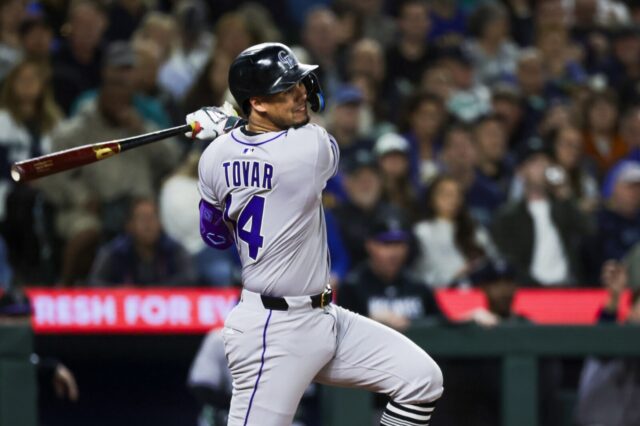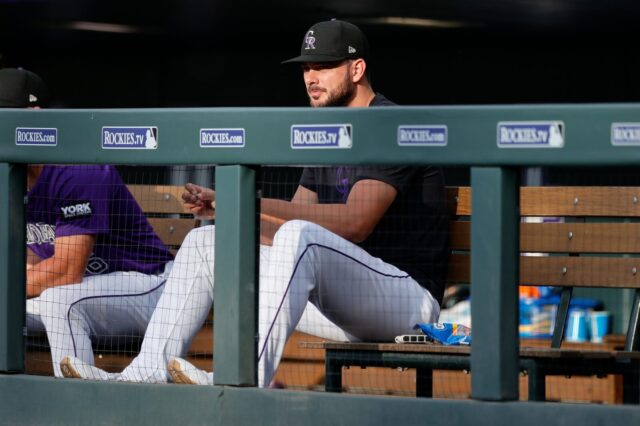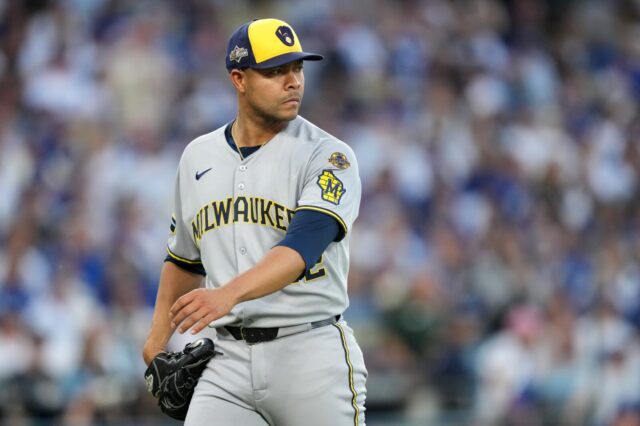Father’s Day can be a lot of things. A day for grilling. A day for watching baseball.
Thus, it’s fitting that the Rockies handed out Father’s Day BBQ spatulas at Coors Field on Sunday.
But that’s not the most apropos Father’s Day parallel that occurred at 20th and Blake under a scorching June sun.
Father’s Day is quite often a day for helping Dad with those chores that are just too big for one man alone to tackle.
Chores like hauling flagstone. Or fixing the swamp cooler. Or getting 27 outs at Coors Field.
Since 2007, Colorado Rockies starting pitchers have just 14 complete games at Coors Field. That’s an average of 1.4 per season. They have none so far in 2017.
The final three outs proved to be the hardest to get on Sunday against the lowly (this year) San Francisco Giants. Were it not for a Nolan Arenado walk-off home run (to complete the cycle and a four-game sweep, no less), the bullpen might be catching some major heat right now.
Rockies manager Bud Black and the players in the Colorado clubhouse will not – I repeat, will not – let Coors Field be an excuse. Every man dressed in purple pinstripes will tell you that the locale doesn’t determine the outcome of the game, the players do.
Credit Black for flipping the script on an excuse that’s grown more and more tired each year the Rockies have failed to win the NL West (24 and counting), but there’s no avoiding the fact that Coors Field is the most hitter-friendly park in baseball.
Over the past five years, Coors Field has ranked No. 1 in “Park Factor” offense, meaning the rate of stats produced there is greater there than any other MLB park. Since 2001, Coors has never ranked outside the top five in Park Factor. Nine times it has been the best park in baseball for offense; six times it has ranked No. 2 or 3; once it has been No. 5. This year it ranks No. 2 (slightly behind Chase Field in Arizona).
Black and the Rockies may not say it, but the stats do. Coors Field puts a greater strain on the home pitching staff than any other park in baseball. Which is why Black and the front office staff need to keep a close eye on the workload they’re asking of their bullpen.
This weekend’s series against the Giants was a perfect example.
After playing 22 of their last 29 games on the road, Colorado returned to Denver and opened the four-game series against the Giants with a pair of very “Coors Field” games.
On Thursday, the Giants rallied against the Rockies bullpen to score eight runs from the seventh inning on, setting the stage for a dramatic Raimel Tapia walk-off 10-9 victory. Friday night, San Fran just wouldn’t go away, and the Rockies held on for a 10-8 victory. Across those two games, Bud Black used seven different relief pitchers (making a total of eight appearances) to earn 21 outs.
By the time Saturday’s game rolled around, only Jordan Lyles had not appeared out of the ‘pen. (He pitched well on both Saturday and Sunday when called upon.) Black had to put starter German Marquez out there for Saturday’s game, if only for emergency use.
On Sunday, that bullpen fatigue finally caught up with Colorado. Black called on Jake McGee to perform the closing duties for Greg Holland, who was unavailable after throwing 58 pitches over three days from Wednesday to Friday. It was McGee’s third appearance of the series, and he gave up a go-ahead home run in the top of the ninth inning after walking a batter on four pitches. He gave up another run off a single and a double to make things 5-3.
From April 15 to June 14, McGee had allowed just one run. He allowed six in three appearances against the Giants.
Colorado’s bullpen has been, by and large, outstanding in 2017. When leading after six innings the Rockies are an impressive 42-1. They’re 44-0 when leading after seven innings.
Still, the bullpen showed some cracks this weekend: 11 runs allowed over seven innings in the first two games, plus a pair of blown saves (Thursday and Sunday). That should have Black and GM Jeff Bridich keeping an eye on who’s available in Triple-A, and weighing their options for when Tyler Anderson and Jon Gray are healthy.
Drawing on a deep talent pool to bolster the pitching staff played a huge part in the success of the 2007 club that won the National League pennant.
That year, Colorado saw 17 different pitchers not considered part of the staff’s “core” (a five-man rotation* and the top seven relievers) contribute a total of 202.2 innings.
*Rodrigo Lopez and Ubaldo Jimenez combined for 29 starts between them as the de facto fifth starter.
In 2007, eight primary “depth” pitchers accounted for 166 of those 202.2 non-core innings; another nine combined for 36.2 innings. That’s 22.5 games worth of innings – or nearly 14 percent of the total workload on the season.
Out of the bullpen this year, Black has really only called on one depth reliever – Carlos Estevez.
Estevez, who was recalled on Sunday when Chad Qualls was sent to the DL with back spasms, has pitched only 14.2 innings this season, yet owns a surprising 4-0 record. Shane Carle logged one inning in his brief call up. Jeff Hoffman also threw 1.1 innings of relief before being moved into the starting rotation.
That’s a total of just 17 innings (2.6 percent of the total workload) this season from guys outside the core staff.
Make no mistake, Colorado’s bullpen has been really good this year. Again, they’re perfect when leading after the seventh inning (thanks in part lately to heroics by Arenado and Tapia). Their ERA is a solid 4.17 – middle of the pack in the NL.
But the 2007 pen was better, especially in terms of ERA. Twenty-two different Rockies combined to post a 3.85 team ERA in relief outings en route to the playoffs and eventually the NL pennant that year.
“If it ain’t broke, don’t fix it,” is a timeless dad cliché (one routinely ignored in my house, I might add). As it stands, there’s no immediate need to tinker with the Rockies bullpen. But the grind of 81 games at Coors Field has proven to be detrimental to a staff year after year after year.
Bud Black has a few arms waiting in the wings to help shoulder the load – darn good ones in starters Gray, Anderson and possibly Chad Bettis. He might be wise to have a few more on the ready, though.
As we saw in 2007, surviving a season at Coors Field requires an army of arms.



